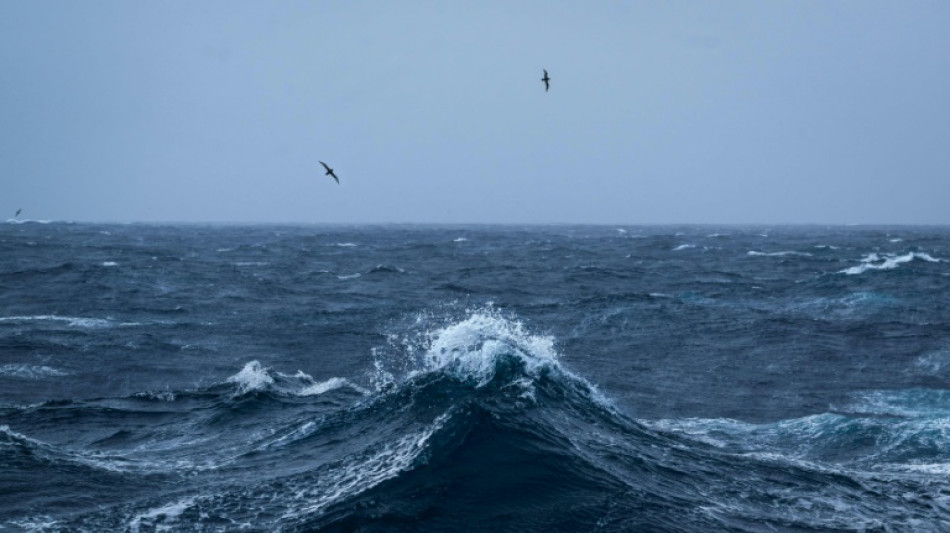
-
 US attempts to seize Russia-flagged oil tanker in Atlantic
US attempts to seize Russia-flagged oil tanker in Atlantic
-
Warner Bros rejects updated Paramount takeover bid, backs Netflix deal

-
 Brigitte Bardot buried in Saint-Tropez as cause of death revealed
Brigitte Bardot buried in Saint-Tropez as cause of death revealed
-
'I don't': AI wedding vows fall foul of Dutch law

-
 German emissions cuts slow, North Sea has warmest year on record
German emissions cuts slow, North Sea has warmest year on record
-
France's Lucu a doubt for Six Nations opener

-
 Could Trump's desire for Greenland blow up NATO?
Could Trump's desire for Greenland blow up NATO?
-
Reigning champion Al-Rajhi abandons Dakar Rally

-
 UN accuses Israel of West Bank 'apartheid'
UN accuses Israel of West Bank 'apartheid'
-
US, Ukraine teams tackle 'most difficult issues' in Russia war talks: Zelensky

-
 Trump says Venezuela to hand over oil stocks worth billions
Trump says Venezuela to hand over oil stocks worth billions
-
Slot says Liverpool can still do 'special things' ahead of Arsenal clash

-
 Brigitte Bardot to be buried in Saint-Tropez as cause of death revealed
Brigitte Bardot to be buried in Saint-Tropez as cause of death revealed
-
Iran executes man on Israel spying charges: judiciary

-
 O'Neil succeeds Rosenior as Strasbourg coach
O'Neil succeeds Rosenior as Strasbourg coach
-
Slot says Liverpool can still do 'special things'

-
 Europe faces transport chaos as deadly cold snap persists
Europe faces transport chaos as deadly cold snap persists
-
Bangladesh in talks with ICC over fate of cricket World Cup games

-
 Bardot to be buried in Saint-Tropez as cause of death revealed
Bardot to be buried in Saint-Tropez as cause of death revealed
-
England's brilliant Bethell savours 'very special' maiden century

-
 Lenovo unveils AI agent to bridge PCs, phones and wearables at CES
Lenovo unveils AI agent to bridge PCs, phones and wearables at CES
-
Gauff drags US into United Cup semis as Swiatek also wins

-
 Oil extends losses as Trump flags Venezuela shipments, stocks mixed
Oil extends losses as Trump flags Venezuela shipments, stocks mixed
-
Medvedev extends strong start to season ahead of Australian Open

-
 Bethell slams maiden century to leave final Ashes Test on knife edge
Bethell slams maiden century to leave final Ashes Test on knife edge
-
Nollywood meets Bollywood: filmmaker fuses Indian, Nigerian culture

-
 India women's historic cricket World Cup win fires up T20 league
India women's historic cricket World Cup win fires up T20 league
-
South Korea's Lee says urged Xi to help curb North's nukes

-
 England's Bethell hits maiden Test century as family watch on
England's Bethell hits maiden Test century as family watch on
-
US car market expected to moderate in 2026

-
 Swiatek, Gauff ease to United Cup victories
Swiatek, Gauff ease to United Cup victories
-
Strasbourg face pitfalls of multi-club system as Chelsea take Rosenior

-
 Bethell stands tall as England 174-3 in final Test, nine behind
Bethell stands tall as England 174-3 in final Test, nine behind
-
Ex-CIA agent convicted of spying for Soviets dies in prison

-
 James, Doncic carry Lakers past Pelicans
James, Doncic carry Lakers past Pelicans
-
Vietnamese caught in Japan's illegal worker crackdown

-
 Nostalgia and new fans as Tamagotchi turns 30
Nostalgia and new fans as Tamagotchi turns 30
-
Oil extends losses as Trump flags Venezuela shipments, stocks wobble

-
 Overseas scholars drawn to China's scientific clout, funding
Overseas scholars drawn to China's scientific clout, funding
-
From music to mind reading: AI startups bet on earbuds

-
 'Of course it's not safe': small city in Russia tries to shrug off war
'Of course it's not safe': small city in Russia tries to shrug off war
-
'Simple' goodbye to Bardot lined up in Saint-Tropez

-
 England lose Crawley as they battle to save final Ashes Test
England lose Crawley as they battle to save final Ashes Test
-
Nvidia CEO praises robots as 'AI immigrants'

-
 Talks on Ukraine guarantees to continue after Paris 'progress'
Talks on Ukraine guarantees to continue after Paris 'progress'
-
The Glimpse Group Strategic Update Letter - Calendar Year 2026

-
 Laser Photonics Announces Appointment of Respected Marketing Executive Nicole Joyce
Laser Photonics Announces Appointment of Respected Marketing Executive Nicole Joyce
-
Ondas to Present at the 28th Annual Needham Growth Conference on January 14, 2026

-
 Bonk, Inc. Bolstered Q4 Balance Sheet with $1 Million Strategic Injection from BONK.fun Operations
Bonk, Inc. Bolstered Q4 Balance Sheet with $1 Million Strategic Injection from BONK.fun Operations
-
Ainos Announces Distribution Partnership with Trusval Technology to Expand AI Nose into Semiconductor Front-End Manufacturing


New treaty plots conservation course for high seas
Protecting life in the vast expanse of ocean beyond national jurisdictions finally has an international roadmap after UN states agreed a landmark high seas treaty at the weekend.
More than a decade in the making, the first international treaty on the high seas aims to promote the conservation and sustainable use of marine biodiversity in international waters -- a vast expanse that covers almost half the planet.
It is seen as essential to conserving 30 percent of the world's land and ocean by 2030, as agreed by world governments in a historic accord signed in Montreal in December.
Ocean ecosystems create half the oxygen humans breathe and limit global warming by absorbing much of the carbon dioxide emitted by human activities.
But only about one percent of the high seas are currently protected.
"What happens on the high seas will no longer be 'out of sight, out of mind'," said Jessica Battle, Senior Global Ocean Governance and Policy Expert, who led WWF's team at the negotiations.
"The High Seas Treaty will allow for the kind of oversight and integration we need if we want the ocean to keep providing the social, economic and environmental benefits humanity currently enjoys."
The text, which has now been published, will be formally adopted at a later date once it has been vetted by lawyers and translated into the United Nations' six official languages.
Here are some key points:
- Ocean at threat -
The treaty begins by recognising "the need to address, in a coherent and cooperative manner, biodiversity loss and degradation of ecosystems of the ocean, due to, in particular, climate change impacts on marine ecosystems".
These impacts include the warming of ocean waters -- the world's seas have absorbed more than 90 percent of the excess heat caused by burning fossil fuels -- along with loss of oxygen, acidification, plastics and other pollutants and overfishing.
The text specifies that it will apply to ocean beyond countries' exclusive economic zones (EEZ), which extend to a maximum of 200 nautical miles (370 km) from the coasts.
It also covers what is known as "the Area", shorthand for seabed and subsoil beyond the limits of national jurisdiction. The Area comprises just over half the planet's seabed.
In principle these measures apply to fishing and mining, although the treaty's decision-making body -- the Conference of the Parties (COP) -- will have to navigate the authority of other regional and global organisations.
Chief among these are regional fisheries bodies and the International Seabed Authority, which currently oversees permits for deep sea mining exploration in some areas and may soon make the controversial move of allowing companies to begin mining.
The treaty will take effect once ratified by 60 countries.
- Marine protections -
Currently almost all protected marine areas are within national territorial waters.
The treaty, however, allows for these to be extended to the open ocean to create sanctuaries, particularly in areas that are fragile, unique or crucial for endangered species.
Most decisions would be taken by consensus, but a marine protected area can be voted into existence with a three-quarters majority, avoiding a situation where one country or small group of nations can block a decision.
One crucial shortcoming: the text does not say how these conservation measures will be monitored and enforced over remote swathes of ocean. Some experts say satellites can be used to spot infractions.
- Sharing the bounty? -
In the high seas, countries and entities under their jurisdiction will be allowed to collect animal, vegetable or microbial matter whose genetic material might prove useful, even commercially.
Scientists, for example, have discovered molecules with the potential to treat cancer or other diseases in microbes scooped up in sediment, or produced by sponges or marine molluscs.
Benefits sharing has been a key bone of contention between wealthy and poorer nations.
The treaty calls for the transfer of marine technologies to developing countries and a strengthening of their research capacities, as well as open access data.
But it left the COP to decide on exactly how any monetary benefits will eventually be shared, with options including a system based on specific details about commercialised products, or more generalised payment systems.
- Assessing impacts -
The treaty requires signatories to assess the environmental impacts of planned activities under their control in the high seas before they are authorised.
It also calls for countries to assess the potential impact on international waters of activities within national jurisdictions that may cause "substantial pollution" or harm the marine environment.
The treaty allows for this to be done under a nation's own environmental assessment protocols, but says this must be published and that the COP's scientific body may "provide comments" on the process.
Ultimately states are responsible for giving the green light to any potentially harmful activity.
Ch.Kahalev--AMWN

